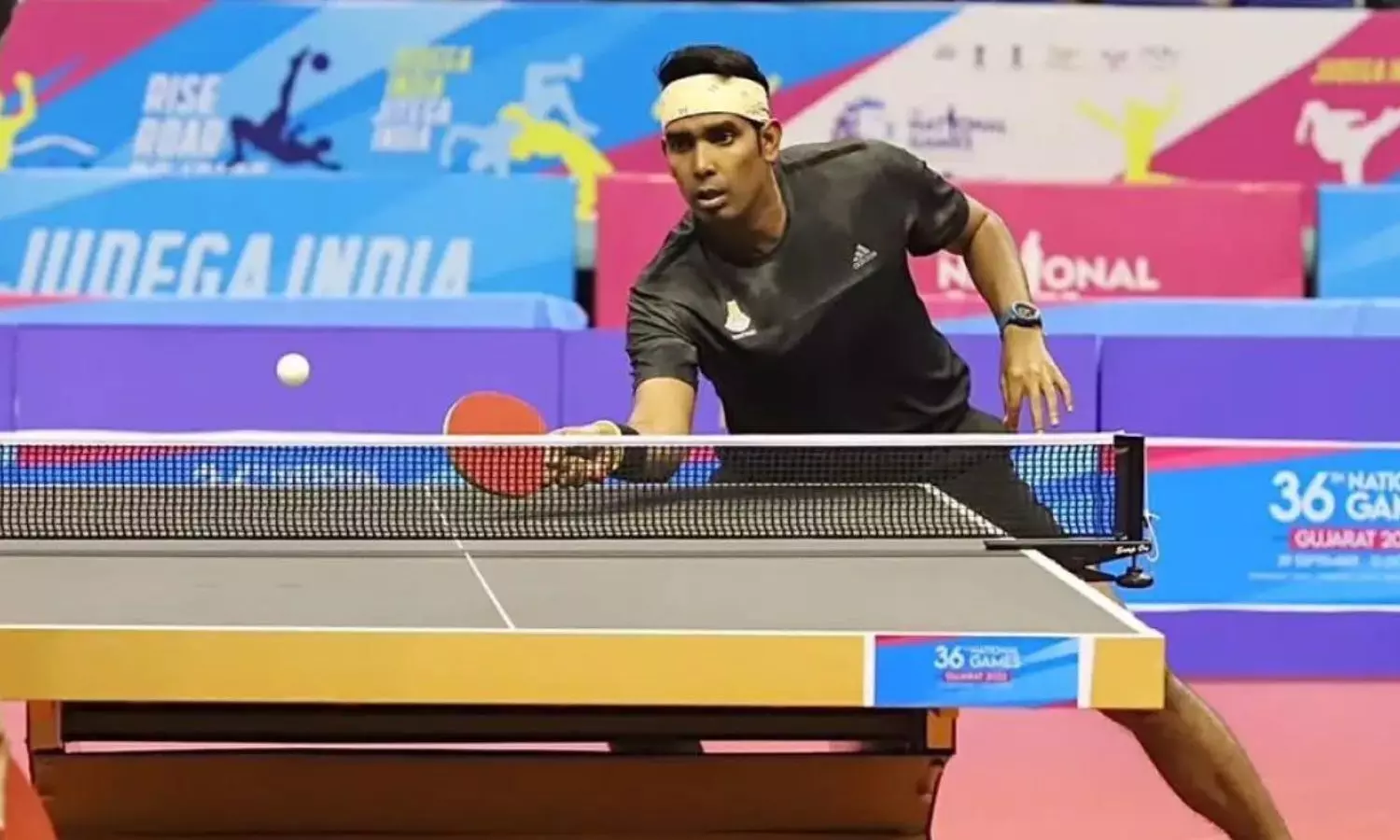National Games
Athlete-first, Govt. exhibition later — The National Games could have been timed better
While the idea behind the National Games is admirable, there are several flaws in the current model that the Government needs to re-evaluate and plan before putting athletes at risk of injuries and fatigue in future editions.

FILE PHOTO: Sharath Kamal in action at the 36th National Games.
The 36th National Games kicked off with a bang in Gujarat a few days ago with the table tennis events taking place, first-off, in full splendour at Surat. The 2022 edition of the multi-sporting event which is based on the Olympic format will feature some of the biggest names of the Indian sporting circuit competing over a span of 20 days.
However, this particular edition has been a long-delayed one - the interim span of which saw an Asian Games, two Commonwealth Games and an entire Olympics also take place. The current edition of the National Games is in fact being held after seven years – in 2020 it got cancelled due to COVID-19 – and unlike the previous editions, this time, the government has made sure to make participation lucrative for top athletes so that their addition to the Games, adds to the desired projection of glitz and glory of India's sporting strength.
Despite these measures, the government has missed out on crucial factors to make the National Games a marquee event on India's domestic sporting calendar.
The Indian Olympic Association (IOA) has made it mandatory for all athletes to compete at the National Games. It means the likes of Avinash Sable (3000m Steeplechase), Murali Sreeshankar (Long Jump), Kidambi Srikanth (Badminton) and many more will take part in the competition - no matter the hectic schedule and grind they are otherwise a part of; those have been put on the back-burner for now, to put all focus on the National Games and exhibit India's sporting merit.
Moreover, the onus has been on the state federations to work closely with the NSFs to pick the top 16 who will then fight for the podium. The winners will then be presented with a medal and a goodie bag. While the intentions seem to have been made in good faith, there are obvious flaws, the biggest of which has been the timing of the National Games 2022.
Are the National Games ill-timed?
It has been a very long season for many athletes across the disciplines. The likes of Jeswin Aldrin, Sreeshankar and Rohit Yadav kicked off their season early this year. In boxing, Mohammed Hussamuddin, Ashish Kumar and many others entered the competition mode in February. And this story spills over to other disciplines as well - the calendar has been chock-a-block with events and the post-Commonwealth Games spell is yet to be over too.
However, while they prepare for the competition their chance of sustaining an injury is higher than ever before.
In a most relevant reference, 40-year-old veteran paddler Sharath Kamal had to retire in his quarterfinal match against Haryana's Soumyajit Ghosh, despite leading two games to one and being 6-1 up in the fourth game, citing back pain at the National Games. The ace paddler had just finished a glorious run at the Birmingham CWG where he clinched four medals - 3 golds, 1 silver - and now naturally the body is on high alert after such a taxing season.
"I am just tired mentally and physically. Right now, I just need a break and spend time away from the field and recuperate," one of the athletes told me.
"My body has just given up on me. Even training right now has become a task," another one echoed.
What is more concerning for me is the boxing group that will be competing in Gujarat. Some of them have been picked up for the Asian Championships, scheduled for later in October. That means that they will have to go through the gruelling process of weight cut for nearly one month.
In the ideal scenario, in the sports which feature weight categories, an athlete should at least have a two-month gap to recover from the weight cut after a competition. Otherwise, the chances of picking up injuries increase.
The prize money discrepancy
Yet another point that I felt is unfair to the athletes is that while some state federations have announced prize money for the medal winners, others have not, calling for a lack of uniformity in the treatment of the winners.
Tamil Nadu, for example, will give the gold medallist Rs 5 lakh. Its neighbouring state Kerala, on the other hand, has decided to do away with the prize money.
"It is so unfair. For one they have made it mandatory for us to compete even when we are not completely fit, and then they are not giving us any prize money also if we win. At least states like Haryana and Tamil Nadu are showing respect to their athletes," an athlete complained.
There needs to be a re-evaluation of the National Games and see how the government overcomes the flaws of the event. They can start by taking feedback from the athletes and coaches after this edition and try to implement them in the 37th National Games. The government also needs to make sure that the multi-sporting event becomes a marquee event on the calendar instead of just any other regular competition in the flavour of a National Championships.
Moreover, the timing of the Games should be in accordance with the international calendar, keeping in mind that the athletes don't feel burnt out before the competition.
These are some changes that require immediate attention to ensure the execution of the event in a seamless fashion for athletes as well. While the idea behind the National Games is still one to admire but its execution still leaves room for something to be desired.
